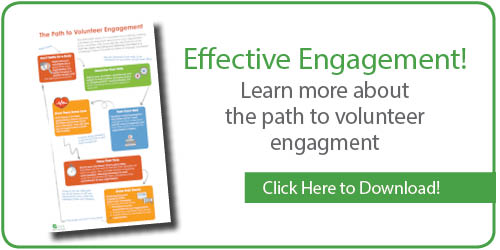 The Area Agency on Aging (AAA) is the lifeblood for most seniors in the United States today. The AAA has the mission of helping seniors age in place, and they face a growing senior population to serve.
The Area Agency on Aging (AAA) is the lifeblood for most seniors in the United States today. The AAA has the mission of helping seniors age in place, and they face a growing senior population to serve.
These organizations have to care for more seniors with smaller budgets and increasingly are turning to volunteers to get the job done. Volunteers are quickly becoming the backbone of the agency, but volunteering across the US is declining.
Luckily, there are several excellent resources for finding senior volunteers looking to help seniors aging in place. First, let’s review the data about volunteering in the United States.
How to Recruit Volunteers For Seniors: Overcome Declining Numbers By Working Smarter
The overall volunteer rate in the United States has declined by 0.4 percent to 24.9 % for the year ending in September 2015, according to the Bureau of Labor Statistics. (This is the most current information available from this agency.)
It is difficult to know why people are not volunteering as much as they once did. Whatever the reason, it is more crucial than ever to be as effective as possible in recruitment. This means finding new, efficient pipelines to the people in your area who want to volunteer and making it easy for them to help in a meaningful way.
Volunteering Data By Age Group
Another essential thing to consider in recruitment efforts is how the data breaks down. People of all ages in many different situations volunteer their time in different ways. Understanding the current percentages of the total number of volunteers in America by age is helpful when shaping new volunteer recruitment strategies.
Ages And Volunteer Rate
- 65 Plus: 23.5%
- 55-64: 25.1%
- 45-54: 28.0%
- 35-44: 28.9%
- 20-24: 18.4%
- 16-19: 26.4%
From this broad base, the numbers define further.
How Marriage And Family Affect Volunteering
Marital and family status affects volunteering. For instance, married persons volunteer at a higher rate in 2015 than those who have never married (29.9 vs. 19.9 %). Having children also increases volunteering. Research suggests that in 2015, parents with kids under 18 were more apt to volunteer than those without children. The numbers break down to 31.3% versus 22.6 %.
How Education Impacts Volunteering And Seniors Helping Seniors
Finally, education impacts volunteer rates as well.
Individuals with higher levels of education are more prone to volunteer than those with less education. Thirty-eight percent of college graduates with a bachelor's degree or higher volunteered in the 25 and up age group. That is compared to 26.5 % of persons with some college or even an associate's degree. The rate of volunteering declines for people across all levels of educational attainment in 2015.
Senior Volunteers Fall Into Familiar Common Ground
It is particularly interesting to note that both men and women volunteer in food preparation, service, and delivery at similar rates. For men it is 9.2% compared to 9.9% of women.
Why Do People Volunteer And How Can We Motivate Them To Help Those Aging In Place
Understanding what motivates people to volunteer will also help you recruit and keep volunteers. To do this, we must consider what motivates volunteers and how to apply those concepts to your outreach.
For instance, 62.5 % of people practice ‘informal volunteering’ which is helping out neighbors outside an organization. Knowing this may help you shape your call to action for volunteers by focusing on direct help to the community.
Senior volunteers create connections with the people they assist and those in need live in their city or town. Consider focusing on this in your recruitment efforts to reach potential volunteers.
Additionally, 85.7% of people say they speak with their neighbors regularly. Agencies can utilize this high impulse to build upon when seeking volunteers to help seniors aging in place. Learning how to recruit volunteers for seniors involves inviting people to translate this natural desire into a structured charity.
Finding Volunteers For The Aging In Place
With the number of nonprofits, philanthropies, and charities, the competition to recruit volunteers is fast and furious. Individuals have more volunteer opportunities offered to them than ever before.
For organizations to maintain and retain their volunteer recruitment numbers, it is essential to continually develop new ways to reach out as well as utilize volunteers.
Senior Volunteer Recruitment Platforms
Current active seniors have a wealth of resources they can use to volunteer. These volunteer platforms are not just for the volunteers, but recruiters as well. As the volunteers sign up, they are asked about their skills, location, and availability. For the Area Agency on Aging, this gives them a pool of available senior volunteers, looking to help other seniors, just a few clicks away.
Elderhelpers.org
Elderhelpers.org is a website that networks volunteers with seniors aging in place in their local area. Recruiters can sign up for a $50 contribution and gain access to preselected volunteers who are committed to providing assistance and companionship to the elderly
Createthegood.org is free to use and also organizes volunteers based on skills and interests. Using the My Profile feature, volunteers select skills they possess, and organizers can easily find them. Make contact right through the platform.
National Service has three services available: RSVP Volunteers, the Foster Grandparent Program, and the Senior Companions Program.
RSVP Volunteers
RSVP volunteers recruit and manage various other volunteers, get involved in green community projects, mentor and tutor children, and respond to disasters.
Senior Companions
These seniors serving seniors are volunteers age 55 and over who make a positive change by offering friendship and help to adults who need assistance with daily living tasks. This allows seniors to remain independent in their homes rather than being forced to move to far more expensive institutional care and have a lower quality of life.
The Senior Companion Program provides grants to qualified organizations and agencies for the dual purpose of engaging active adults, especially those with limited incomes, in volunteer service to meet up with critical community needs; and also to make a top quality experience that will enrich the lives of the volunteers. Program funds are used to support Senior Companions in providing supportive, individualized services to assist adults with special needs maintain their independence and dignity.











